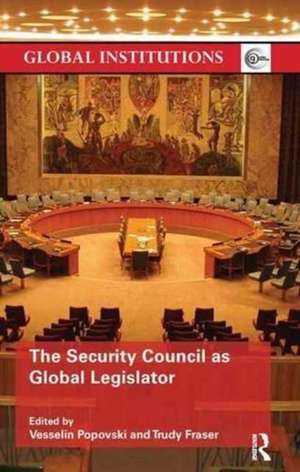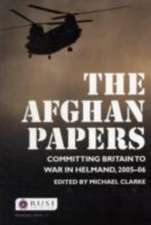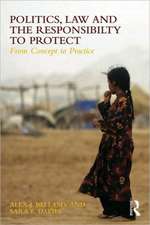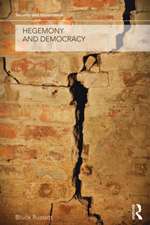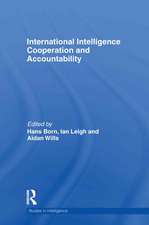The Security Council as Global Legislator: Global Institutions
Editat de Vesselin Popovski, Trudy Fraseren Limba Engleză Paperback – 11 oct 2016
This book seeks to move away from the discussions of whether the Security Council – in the current composition and working methods – is representative, capable or productive. Rather it assesses whether legislative activity by the Security Council can be beneficial to international peace and security. The authors examine and critique the capacities of the Security Council to address thematic international threats - such as terrorism, weapons proliferations, targeting of civilians, recruitment of child soldiers, piracy – as an alternative to the traditional model of addressing country-specific situations on a case-by-case basis. Ultimately, the book seeks to assess the efficacy of the Security Council as global legislator in terms of complementing the Security Council’s mandate for the maintenance of international peace and security with a preventative and norm-setting capacity.
The book presents views from a diverse range of Security Council stakeholders including academic scholars, political analysts, and international lawyers. This resource will be of great interest to students of international relations, international organizations and international security studies alike.
| Toate formatele și edițiile | Preț | Express |
|---|---|---|
| Paperback (1) | 367.83 lei 6-8 săpt. | |
| Taylor & Francis – 11 oct 2016 | 367.83 lei 6-8 săpt. | |
| Hardback (1) | 1112.34 lei 6-8 săpt. | |
| Taylor & Francis – 3 iul 2014 | 1112.34 lei 6-8 săpt. |
Din seria Global Institutions
-
 Preț: 286.43 lei
Preț: 286.43 lei -
 Preț: 346.55 lei
Preț: 346.55 lei -
 Preț: 303.17 lei
Preț: 303.17 lei -
 Preț: 279.80 lei
Preț: 279.80 lei -
 Preț: 279.88 lei
Preț: 279.88 lei -
 Preț: 316.56 lei
Preț: 316.56 lei -
 Preț: 326.01 lei
Preț: 326.01 lei -
 Preț: 271.41 lei
Preț: 271.41 lei -
 Preț: 310.65 lei
Preț: 310.65 lei -
 Preț: 301.40 lei
Preț: 301.40 lei -
 Preț: 294.01 lei
Preț: 294.01 lei -
 Preț: 365.03 lei
Preț: 365.03 lei -
 Preț: 306.81 lei
Preț: 306.81 lei -
 Preț: 326.36 lei
Preț: 326.36 lei -
 Preț: 356.46 lei
Preț: 356.46 lei -
 Preț: 188.80 lei
Preț: 188.80 lei -
 Preț: 345.89 lei
Preț: 345.89 lei -
 Preț: 363.25 lei
Preț: 363.25 lei -
 Preț: 363.20 lei
Preț: 363.20 lei - 18%
 Preț: 1001.55 lei
Preț: 1001.55 lei - 26%
 Preț: 761.76 lei
Preț: 761.76 lei - 18%
 Preț: 999.82 lei
Preț: 999.82 lei -
 Preț: 447.90 lei
Preț: 447.90 lei -
 Preț: 384.16 lei
Preț: 384.16 lei -
 Preț: 440.69 lei
Preț: 440.69 lei -
 Preț: 369.18 lei
Preț: 369.18 lei -
 Preț: 368.90 lei
Preț: 368.90 lei -
 Preț: 345.89 lei
Preț: 345.89 lei -
 Preț: 360.10 lei
Preț: 360.10 lei - 18%
 Preț: 998.71 lei
Preț: 998.71 lei - 18%
 Preț: 1113.25 lei
Preț: 1113.25 lei -
 Preț: 358.84 lei
Preț: 358.84 lei - 17%
 Preț: 246.93 lei
Preț: 246.93 lei - 18%
 Preț: 1160.47 lei
Preț: 1160.47 lei - 18%
 Preț: 1052.38 lei
Preț: 1052.38 lei -
 Preț: 381.03 lei
Preț: 381.03 lei -
 Preț: 364.51 lei
Preț: 364.51 lei - 28%
 Preț: 819.48 lei
Preț: 819.48 lei - 18%
 Preț: 1106.36 lei
Preț: 1106.36 lei - 18%
 Preț: 999.46 lei
Preț: 999.46 lei
Preț: 367.83 lei
Nou
Puncte Express: 552
Preț estimativ în valută:
70.40€ • 75.99$ • 59.03£
70.40€ • 75.99$ • 59.03£
Carte tipărită la comandă
Livrare economică 18 aprilie-02 mai
Preluare comenzi: 021 569.72.76
Specificații
ISBN-13: 9781138289574
ISBN-10: 1138289574
Pagini: 350
Dimensiuni: 138 x 216 x 27 mm
Greutate: 0.41 kg
Ediția:1
Editura: Taylor & Francis
Colecția Routledge
Seria Global Institutions
Locul publicării:Oxford, United Kingdom
ISBN-10: 1138289574
Pagini: 350
Dimensiuni: 138 x 216 x 27 mm
Greutate: 0.41 kg
Ediția:1
Editura: Taylor & Francis
Colecția Routledge
Seria Global Institutions
Locul publicării:Oxford, United Kingdom
Public țintă
Postgraduate and UndergraduateCuprins
Introduction, VESSELIN POPOVSKI 1. Constitutionalism and the law: evaluating the Security Council, ANTHONY F LANG, JR 2. The coming “Coke Moment”, CHARLES SAMPFORD 3. Parsing Security Council resolutions: a five-dimensional taxonomy of normative properties, HUGH BREAKEY 4. Quis custodiet consilium securitatis? Reflections on the lawmaking powers of the Security Council, JAN WOUTERS and JED ODERMATT 5. A “legislative” evolution: Security Council resolution 1540 revisited, OLIVIA BOSCH 6. Security Council legislation in counter-terrorism, MONIKA HEUPEL 7. Security Council resolutions on Somali piracy, PETER LEHR 8. The Security Council as global executive but not global legislator: the case of child soldiers, NOËLLE QUÉNIVET 9. The Security Council as legislator and norm builder: impacts on efforts to promote the women, peace, and security agenda
ROBERT ZUBER and MELINA LITO 10. Protection of civilians and law-making in the Security Council, HUGH BREAKEY 11. From environmental governance to environmental legislation: the case of climate change at the Security Council, TRUDY FRASER 12. The Security Council and ad hoc tribunals: law and politics, peace and justice, MARTIN J. BURKE and THOMAS G. WEISS, 13. The International Criminal Court and the Security Council
VESSELIN POPOVSKI, 14. Conclusion: the Security Council as global legislator, TRUDY FRASER
ROBERT ZUBER and MELINA LITO 10. Protection of civilians and law-making in the Security Council, HUGH BREAKEY 11. From environmental governance to environmental legislation: the case of climate change at the Security Council, TRUDY FRASER 12. The Security Council and ad hoc tribunals: law and politics, peace and justice, MARTIN J. BURKE and THOMAS G. WEISS, 13. The International Criminal Court and the Security Council
VESSELIN POPOVSKI, 14. Conclusion: the Security Council as global legislator, TRUDY FRASER
Descriere
This book seeks to move away from the discussions of whether the Security Council —in its current composition and working methods—is representative, capable, or productive – as such issues are already extensively debated in other forums. Rather the book seeks to assess whether the specific legislative activity by the Security Council as such, in principle, can be beneficial to international peace and security. If instead of waiting for ‘threats to the peace’ to emerge from country-specific situations (where permanent members can also be biased and use veto) the Security Council is addressing generic international threats—such as terrorism, weapons proliferation, targeting of civilians, recruitment of child soldiers, piracy etc.—can this be instrumental in adding a preventive and standard-setting framework to the Security Council’s more traditional roles for the maintenance of international peace and security?
